#si-aux
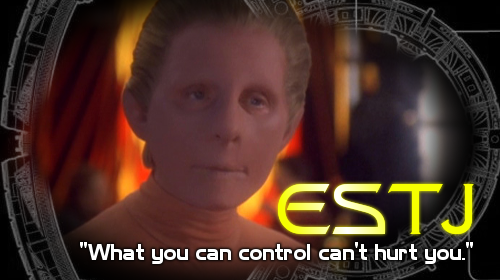
ESTJ – the Director, the Achiever, the Optimizer
When we type a villain, we usually expect their inferior function to be their fatal weakness. For Te-doms, the stereotype is that they have no moral oversight to their actions. By contrast, the intimidating Founder has a very clear moral vision–she believes she is absolutely entitled to wield control over other, lesser species.
Another of DS9’s ESTJ villains, the meddling Brunt, acts the same way. He enforces the laws of Ferengi society with an aggressive sense of justice. Just like a weak inferior-Te user might use faulty logic to defend their subjective beliefs, inferior-Fi can provide the comfort of self-righteousness to an over-controlling ExTJ.
(This character was never given a name on the show. Instead, she was referred to in dialogue and in the credits as simply, “Female Changeling.” That’s super clunky and annoying to type over and over, so for simplicity’s sake, I’m just calling her “The Founder.”)
Dominant Function: (Te) Extraverted Thinking, “The Workshop”
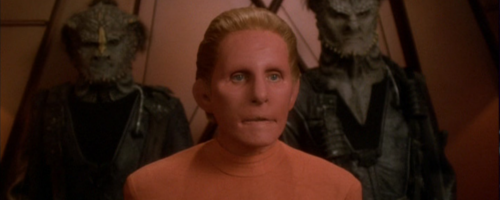
The Founder’s major directive is to bring every civilization she meets under the control of the Dominion. She sees it as her calling to bring order to a galaxy racked with chaos. Solids, she believes, don’t know enough to govern themselves, and so the Founders must lead.
The Founders exert control over their realm through their minions, the loyal Vorta and Jem’Hadar. Both races are genetically engineered to be obedient without question, and to view the Founders as gods. For further control, the Jem’Hadar are engineered to be addicted to a drug called Ketracel-white, which only their “gods” provide.
The Founder is supremely confident and implacable even in the face of setbacks. She always believes the Dominion will succeed, and repeatedly tells her enemies how doomed to failure their efforts are. She’s completely intolerant of failure and incompetence, and grows more demanding with her subordinates as the war drags on.
Auxiliary Function: (Si) Introverted Sensing, “The Study”

Millennia ago, Changelings were hunted down by solids who feared and distrusted them. The survivors formed the Dominion, and began conquering the solids in an effort to ensure that they were never persecuted again. The Founder sees all non-shapeshifters through the lens of this story, and won’t accept them as anything other than dangerous, small-minded brutes.
She finds existence as a humanoid limiting compared to the way she lives when she’s at home in the Great Link. Though she describes the Link to Odo in abstract terms, I don’t think this puts it outside the realm of sensory experience. Si, because it’s personal to the user, can feel abstract and hard to describe, like any other Introverted function.
Odo’s Si-experience is usually of being in one form, while The Founder has been many different shapes and beings over the centuries. She can replicate anything or anyone down to the last tactile detail, and shares the experience of all the other Changelings she’s with in the Link, who have also taken many forms. Thus her life experience is multi-faceted and expansive, and she very naturally feels that she is wiser and has more understanding of the universe than solids trapped in one form. That she refuses to consider their perspective until Odo links with her betrays the hidden rigidity of her thinking.
Tertiary Function: (Ne) Extraverted Intuition, “The Hiking Trails”

The Founder takes pride in being a shapeshifter, and gets bored and frustrated having to stay in the shape of a humanoid for too long. She pushes Odo to think outside the box (or bucket) of his bipedal existence, to experience the essence of different objects and lifeforms. She uses language that sounds mysterious and abstract to him as she describes life in the Great Link, hinting that she may be not so much an individual, but a “drop” of the Great Link that “becomes the ocean” when she returns.
On the other hand, the Founder’s ideas of humanoids have solidified, if you will, and she will not be moved in her perception. She tries love-making in the humanoid style, and is not impressed. When she’s infected with a wasting disease by Starfleet’s secretive Section 31, this only confirms her cynical view of humans. As her war efforts begin to fail, she begins to loop, ordering the swift execution and re-cloning of her Vorta scientists to provide a fresh perspective on their work to cure her.
Inferior Function: (Fi) Introverted Function, “The Deep Well”
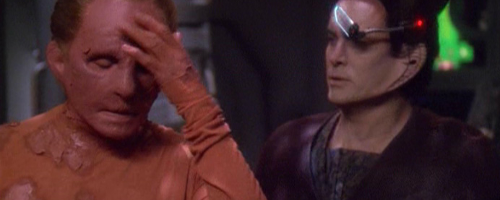
The Founder pursues her mission to dominate the galaxy with an air of moral superiority. She believes that Changelings are a higher life-form than all non-changelings, giving the Founders the right and duty to conquer. She needs allies like the Breen and the Cardassians to build her forces, but she still views them with disdain, and will manipulate them to serve her purposes.
Her greater mission, beyond conquering the Alpha Quadrant, is to bring Odo home. She’s tender and patient with him, repeatedly inviting him to return to the Link. She and the other Founders feel forced to punish Odo for breaking their one rule—that no Changeling ever harms another Changeling—but once his time is served, she once again entreats him to join their ranks. Though he has chosen life with the solids, she assures him that he will always be a Changeling in the eyes of his people.
The Founder grows testy as the infection breaks her down, and the Alpha Quadrant refuses to surrender to her will. She denies her condition at first, not wishing to show weakness, but then she stops caring how anyone sees her. She bullies, criticizes, threatens, and abuses her subordinates. She orders mass executions of Cardassians to punish the insurgent movement, and then orders the whole planet wiped out when it looks like the Dominion has lost.
When at last Odo links with her, sharing the cure for her infection as well as his more tolerant perspective on the solids, the Founder surrenders. She signs a peace treaty to end the war, and voluntarily submits herself to imprisonment for her war crimes. Even so, she keeps her head held high.
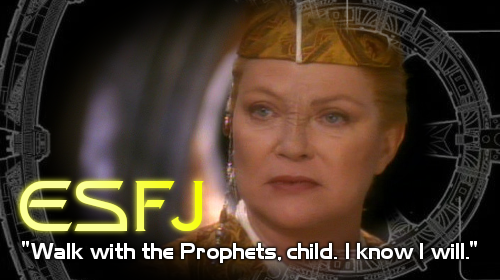
ESFJ – the Provider, the Facilitator, the Caretaker
A smiling, self-righteous old lady enters the place our family of misfit characters calls home and immediately sets everyone on edge with her overbearing rules and conspiratorial grabs for power.
Nope, we’re not profiling Dolores Umbridge today. It’s Star Trek’s own Space Pope, the chillingly wicked Kai Winn. DS9 has some truly lovely Fe-doms on board, but Winn brings the Mean Girl-ness to a religious level.
Dominant Function: (Fe) Extraverted Feeling, “The Garden Fountain”
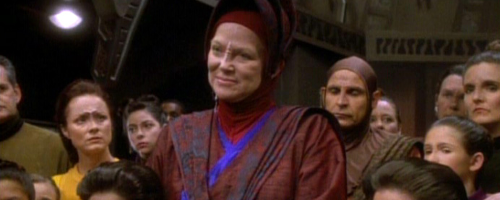
When Winn Adami first saw the wormhole—or the Gates of the Celestial Temple, as her people believe them to be—she felt nothing. All her fellow Bajorans around her, however, reacted in awe, and Winn felt she had to display the proper response. She never has a personal experience with the Prophets her entire life, but rather loops through her Fe-Ne, playing along with the Bajoran faith to pretend that she believes what everyone else believes.
Her rise to power is driven by her need to be seen as more righteous than others despite her insecurities. She finds it deeply distasteful that the Prophets chose an outsider like Sisko as their Emissary. She can’t even get out of his shadow after she ascends to Bajor’s highest religious position. Winn speaks sweetly even to her enemies—perhaps more so—and passive-aggressively insults those she dislikes, always acting shocked when someone (usually Kira) calls out her true motives.
Winn does try to do some good. As a young ranjen, she convinced her superior to take a more active role in fighting the Cardassians, and was able to use gemstones from the tabernacle to bribe Cardassians for small acts of kindness. This saved a precious handful of lives. She confronts Kira for acting like only the members of the Resistance put up any kind of fight during the Occupation.
Winn is outspoken as head of her order, though she’s disappointed that they don’t have as influential a voice as she thinks they should. She sees the Federation and its allies as intruders who will negatively influence Bajoran culture, and leads a boycott against Keiko’s school on charges of blasphemy. The whole show is secretly an assassination plot against Vedek Bareil, her chief rival for the position of Kai, and a more progressive and popular leader than she is.
Whenever someone else threatens to steal her spotlight, Winn’s conspiratorial wheels start churning. She supports the return of the long-lost Akorem Laan as the new Emissary rather than Sisko—that he brings back the traditional caste system doesn’t hurt either. She digs up dirt on Bareil during the election for Kai, which wins her the position, and then makes friends with him when she needs his assistance to negotiate a peace treaty with Cardassia. He’s mortally wounded during the process, and Winn pretends to care about his physical well-being just long enough to complete the talks.
Then she decides he should die with dignity.
Shortly thereafter, Winn wiggles her way into the temporary position of First Minister, a blatant and dangerous combo of church and state. When Kira and former resistance leader Shakaar stand up to her, Winn acts deeply offended. But she quickly offers a statement of support for Shakaar once he’s elected the new First Minister.
Winn briefly begins to come around to Sisko when he discovers the lost Bajoran city of B’Hala. She helps him through his troubling visions, showing true concern and care, and really seems to speak from the heart when confronting Kira about her distrust of her motives and courage. Her diplomatic skills even shine when she negotiates a non-aggression pact between Bajor and the Dominion, assuring the obsequious Weyoun that they are nothing alike, “Nothing at all.”
But Winn’s insecurity gets the best of her, and she returns to her old ways when Sisko tries to unleash the Reckoning. She just can’t live with the idea that Bajor’s fate would be decided by a foreigner, and so she interrupts the process, claiming she did it to save Sisko’s son. Once she starts receiving visions from the Pah-wraiths, Winn tries one more time to redeem herself by confessing her problem—and her pride—to Kira.
Kira recommends that Winn step down, and the Kai feels immediately insulted that she should give up her position after years of faithful service. She resents that the Prophets have never personally spoken to her, and refuses to humble herself to them. Eventually, she gives herself over to the Pah-wraiths, and to a relationship with Dukat, and together they plot the destruction of Bajor.
Traditionally, XNTJs are the ones typed as the villains who want to destroy everything, but when an Fe-dom villain decides that everyone must pay, everyone better watch out.
Auxiliary Function: (Si) Introverted Sensing, “The Study”
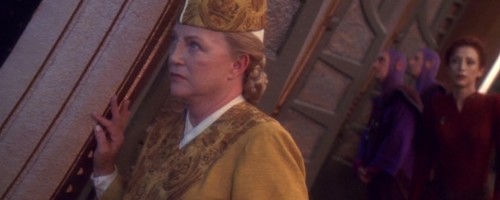
It’s easy to forget that every Bajoran we meet on DS9 only recently came out of a period of great suffering. Winn keeps her condescending composure quite well, but she tells Kira that she remembers “each and every beating” the Cardassians gave her during the Occupation. Though she’s never known the touch of the Prophets, Winn’s resilience in these times seems to serve as the one true touchstone of her faith.
That her endurance is never rewarded by the Prophets angers her deeply. Perhaps she’s looping too hard to appreciate her own personal experiences, reaching for an idealized religious experience that she imagines everyone else has had. When she finally turns on the Prophets, it’s after years of feeling neglected by them.
Till then, Winn holds to the orthodox practices of the Bajoran faith. She doesn’t want non-Bajoran scientific principles taught in the school, and she supports the old caste system during its brief return. She’s distrustful of outsiders and wishes the Prophets had chosen a Bajoran (maybe her?) as their Emissary.
Tertiary Function: (Ne) Extraverted Intuition, “The Hiking Trails”

Winn’s a master of pretense, quickly changing allies and stories to go with the flow of public opinion. Her ambition pushes her into greater positions of power, often before she’s had the experience to know what to do once she gets there. Though she’s initially frightened at the thought of leaving the religious establishment she spent her life in—and allying herself with Bajor’s greatest enemy—once she gives up the Prophets for the Pah-wraiths, she feels a delicious freedom she’s never known before.
Inferior Function: (Ti) Introverted Thinking, “The Laboratory”
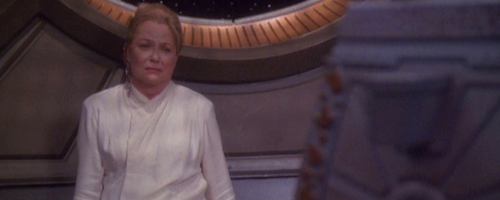
In private moments, Winn will sometimes let down her smiling façade and bite back at those who dare criticize her. She’s anxious and panicky in moments when she realizes her ambition has bitten off more than she can chew, and can’t discern her options. She’s cold and calculating in her grabs for power, and can dismiss the lives she must step on in order to get where she believes she deserves to be. Once her faith fails her, she sees the hard truth of her own hypocrisy, and then blames all her problems on the Prophets and the Bajoran people themselves.
In her final moments, she recognizes her error, and helps Sisko fight Dukat, moments before the Pah-wraiths incinerate her.
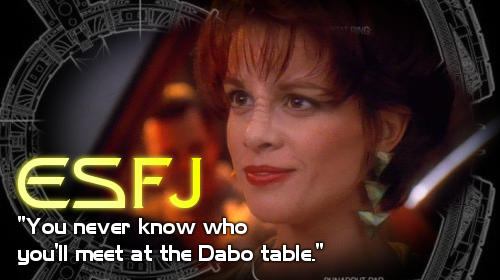
ESFJ – the Provider, the Facilitator, the Caretaker
Like Kira, Leeta’s a young Bajoran woman who survived the Occupation. While one of them picked up a gun, though, the other picked up some Dabo skills. Kira’s Fi-dom makes her edgy and angry, while Leeta moves through the world with an Fe-dom’s openness and generosity, making her living as the life of the party in the hub of DS9’s communal bazaar.
They both fall for some pretty weird Introverted dudes, though.
Dominant Function: (Fe) Extraverted Feeling, “The Garden Fountain”
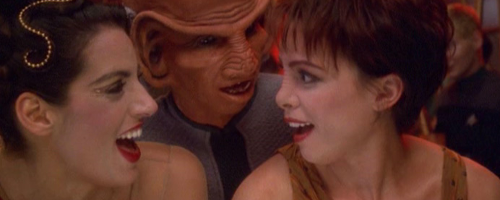
Like her ESFJ boss, Leeta’s gift is hospitality. She entertains guests every day at Quark’s Bar, coaxing their energy up to keep the room lively. Her job is to make sure everyone is happy, enthusiastic, and spending money. She’s something of an amateur sociologist, which comes in handy considering all the diverse people she meets in her line of work.
Leeta’s a very skilled people-person, and quick to make friends. She’s barely known Jadzia for more than a few weeks (like, one episode) before Dax invites her to participate in the very intimate ceremony of sharing a consciousness with one of her past hosts. She coyly flirts with Julian, feigning illness to get his attention; and when it’s time to break up, she finds an amicable way to do it that ensures no hard feelings.
Leeta’s a good judge of character, and sees potential and lovability in Rom long before he does. When he starts a labor union, she helps get the bar employees on board, and encourages Rom in his cause. She waits for him to make the move when it comes to romance, which means she has to wait quite a while. When they have an argument that almost cancels their wedding, she has to vent to her friend Kira, an Fi-dom who patiently listens and then bluntly tells her she doesn’t really mean the angry things she’s saying.
Leeta leaves the station just before the Dominion invasion, accepting Rom’s wishes to keep her out of harm’s way. Before long she’s back, working the Dabo table while secretly joining Kira’s resistance. Now she’s the one fearing for Rom’s safety, as he’s been captured for his sabotage—but Rom doesn’t want to be rescued.
Leeta and Quark, anxious ESFJs that they are, can’t accept this, and they argue with Rom about how stupid he is for refusing their help. Leeta experiences a similar barrier when Nog returns from his surgery after losing his leg. Ezri has to hold back Leeta, now Nog’s step-mother, from comforting her traumatized step-son until he’s ready. When he is, Leeta joins in the family hug to welcome him back.
Auxiliary Function: (Si) Introverted Sensing, “The Study”

Leeta appreciates her Bajoran heritage, introducing Julian to the Rite of Separation when their relationship ends. She wants a traditional Bajoran wedding, and resists Rom’s efforts to get her into something more scanty for the ceremony. In her day job, though, she’s very comfortable in her own skin, and always looks great. She’s so comfortable, in fact, that she answers the door of her quarters without realizing she’s lost her towel.
(And a bit of non-canon info from the post-TV novels, because I think it’s cool: Leeta’s full name was never given because she was orphaned during the Occupation and never knew her family. Once she married a Ferengi, whose people have no family names, it didn’t matter anymore. She stuck quite happily with her single, unique name.)
Tertiary Function: (Ne) Extraverted Intuition, “The Hiking Trails”

Like any Bajoran who had to survive the Occupation, Leeta can be flexible and adaptable. After a few years of working at Quark’s Bar, she experiences anxiety over the lack of direction in her life, feeling like she should do more, and accepts a position at a distant starbase running their café. When Rom confesses his love to her, she changes course again, starting a new life as part of a Ferengi family. She sees the potential of Rom’s labor union, and demands more and better pay from Quark.
Inferior Function: (Ti) Introverted Thinking, “The Laboratory”
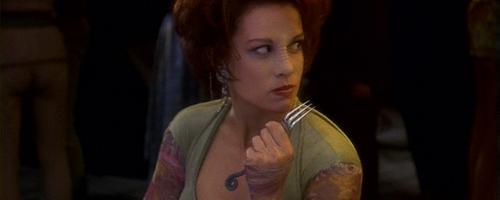
When she puts her mind to it, Leeta can be quite formidable. She studies up on the Trill zhian’tara ritual, and helps Jadzia explain it to the group. She’s insulted that Quark thinks she has no brains, appreciating her only for her physical assets, but she puts up a fight more than once when she figures out she can argue for better working conditions.
When she and Rom reach an impasse about signing a pre-nuptial agreement, she breaks off the engagement and complains to Kira about him. She’s trying very hard to convince herself she doesn’t like him, picking at any fault she can think of. But Kira knows she doesn’t mean it, and they eventually work out the problem.
Love between a Bajoran and a Ferengi is an inscrutable thing, but Leeta doesn’t have to think twice about it.
